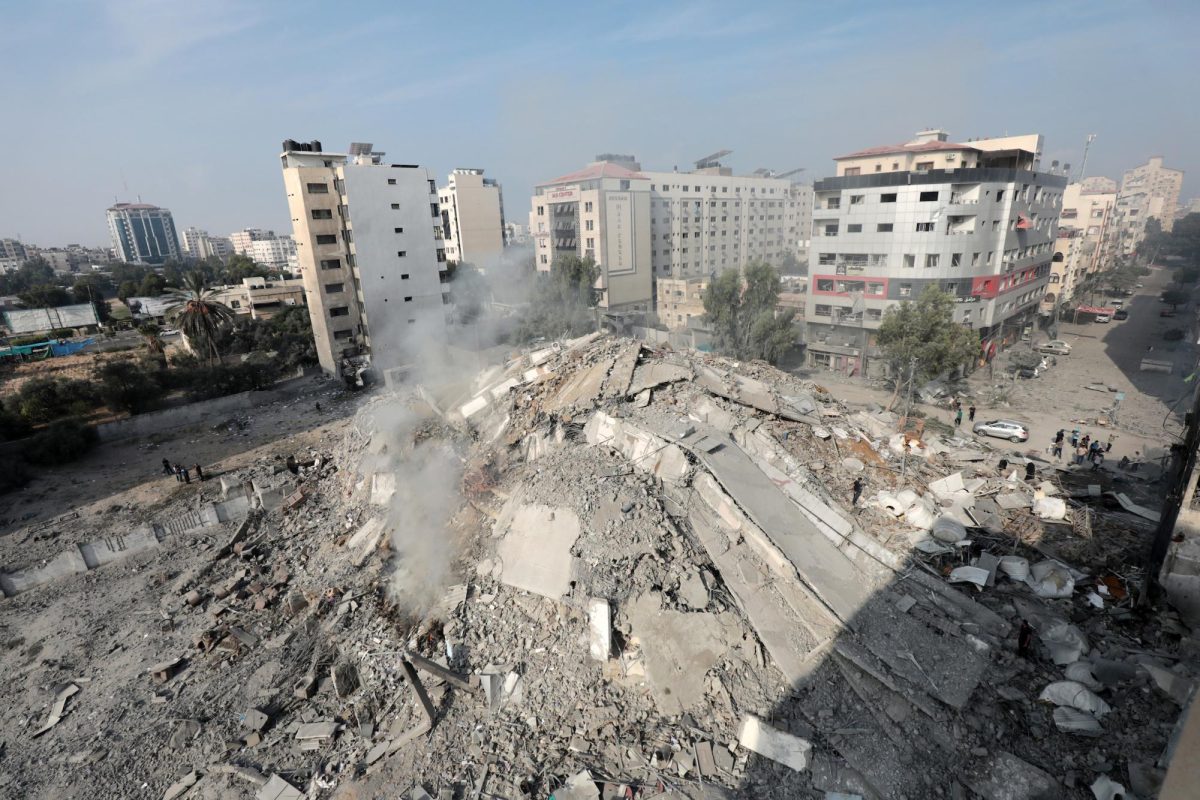Israel and Hamas have been engaged in perilous warfare since Oct. 7, 2023 when Hamas, a terrorist power that governs the Gaza Strip, attacked and killed an estimated 364 civilians during the Supernova Sukkot Gathering, an Israeli electronic music festival coinciding with two major Jewish holidays. Nearly a thousand more deaths of Israeli civilians, international tourists and Israeli Defense Forces were reported outside the festival on the same day. Survivors have given harrowing accounts of the initial attacks, while others are still held captive by Hamas and the smaller Palestinian Islamic Jihad group.
These attacks led Israel to declare war on Hamas, resulting in a months-long conflict between Israel and Hamas. This war however, has left both sides in international controversy: they broke international law. Following the attacks of Oct. 7, the United Nations (UN) held a closed door meeting which reached no consensus over the attacks. Soon after this meeting, Israel bombarded the Gaza Strip, the area that Hamas occupies, killing thousands of Palestinian civilians. Had the UN reached a consensus, it is possible that further conflict could have been prevented between Hamas and Israel, and violent retaliation from Israel may have been limited.
Hamas has long inflicted terror on the Israeli people, engaging in conflict with Israelis and backing the launches of thousands of rockets from Gaza into Israel prior to these attacks, wounding and killing over 200 Israeli soldiers and citizens since 2008. Israel, however, has been attacking Palestinian people in an attempt to reach Hamas for decades. In fact, upwards of 4,000 Palestinians were killed by Israeli forces between 2008 and the attacks of Oct. 7, according to B’Tselem, the Israeli Information Center for Human Rights in the Occupied Territories. This simply demonstrates the continuous conflicts that have arisen due to the cohabitation of Israeli citizens and Palestinian refugees. The idea of a Jewish state in Jerusalem had long held the support of Great Britain during World War I. After the end of the war, the League of Nations, a failed precursor to the UN, gave the British a mandate to govern Palestine, which included provisions for the establishment of a Jewish homeland.
Soon after the end of World War Two, Israel was formed in Palestine, with major backlash from the surrounding Arab states, including Palestine, resulting in the Arab-Israeli war which ended in an Armistice agreement, defining the borders of the State of Israel and the territories in which the now displaced people of Palestine would be made to settle in. The Zionist idea of creating a Jewish homeland in and around Jerusalem has created numerous conflicts between Israel and Palestine, like the 1972 Munich Massacre in which eleven Israeli Olympic athletes and officials were kidnapped and killed by Black September, a now defunct extremist militant group of the Palestinian organization Fatah. In the 1982 Sabra and Shatila massacre, Israel-backed militants massacred thousands of Palestinian refugees in Lebanon. The UN should actively be doing more to save the lives of Israeli and Palestinian people.
The UN has long been a peace-keeper, ever since its inception at the end of World War II. It has aided in resolving international conflicts, humanitarian crises and promoting global cooperation through diplomatic efforts. The UN facilitated the Dayton Agreement, which helped establish the framework for the country of Bosnia and Herzegovina following the Bosnian Wars in 1995. They also assisted in historic peace negotiations between the Colombian government and the Revolutionary Armed Forces of Colombia in 2016. They’ve even gone as far as deploying UN peacekeepers in Lebanon to subdue the conflict between Israel and Hezbollah in 2006. The UN has proven on many historic occasions that they can help nations in need.
“Israel must be given steadfast support to defend [itself],” Gilad Erdan, the Israel Ambassador to the UN said.
The support Israel seeks won’t be coming directly from the UN, however, because on Nov. 15th, the UN Security Council voted to adopt a resolution calling for more humanitarian pauses and corridors of aid to Gaza. Calling for more pauses for aid is, frankly speaking, hollow, and doesn’t aim towards solving the big issue – stopping the war. In this council meeting the permanent leaders failed to condemn Hamas for their horrific actions, while Israel’s actions were disregarded by the majority. And the resolution only briefly mentions the Oct. 7th attacks in Israel, where Hamas killed thousands, as well as Israel’s response with daily airstrikes and a ground offensive in Hamas-ruled Gaza that has reportedly killed upwards of 10,000 Palestinians.
This blatant disregard of what is actually happening in Gaza has shone a spotlight on the UN. If a global organization can overlook the most horrifying events of this conflict, it raises questions about when they will take effective measures to put an end to the ongoing conflict. Effective measures to end a conflict could be limiting Israel’s ability to bombard the Gaza Strip by imposing trade barriers toward Israel, and sending peacekeeping troops to ensure Israel’s inactivity is not taken advantage of by Hamas forces.
The US, like Israel, has completely rejected voting in the affirmative towards any resolution that fails to condemn Hamas’ actions towards the Israeli people and the international tourists killed and taken hostage. On Dec. 8, the US vetoed a resolution proposed by the UN Security Council, prolonging the war and destruction to the Gaza Strip, and the Palestinian people.
“The Security Council’s failure to condemn Hamas’ Oct. 7 terrorist attacks including its acts of sexual violence and other unthinkable evils, is a serious moral failure,” Robert Wood, Ambassador and Deputy Permanent Representative of the United States to the UN, said.
On Dec. 12, the UN General Assembly finally passed a resolution by large majority to demand a humanitarian cease-fire, the immediate release of all hostages, the guarantee of humanitarian access and a reminder that all parties must comply under the obligations of international law in regards to the protection of civilians. Since the Oct. 7 attacks, over 15 UN Security Council meetings have been held to discuss the humanitarian crises in Gaza, and to call for a cease-fire in the war as well as the safe passage of hostages. With each Security Council meeting, the overall support for Israel and the number of votes in their favor has dwindled greatly.
In the resolution passed most recently a mere ten countries voted against the cease-fire: Israel, Austria, Czechia, Guatemala, Liberia, Micronesia, Nauru, Papua New Guinea, Paraguay and the United States. America is the only country in this list that is one of five permanent members of the Security Council, a role that holds great power in decision making, to vote against the resolution.
“Not only does this resolution fail to condemn Hamas for crimes against humanity, it does not mention Hamas at all. This will only prolong the death and destruction in the region, that is precisely what a ceasefire means,” Erdan said on Dec. 12.
Even with so much global support for a cease-fire, the State of Israel plans to march ahead, demonstrating the toothless nature of the UN, as they still haven’t called for sanctions against Israel. Their commitment to not condemning Hamas might be the only reason administrative action has not yet been taken. The Dec. 8 vote vetoed by the US could have brought the war closer to its end.
The conflict between the State of Israel and Hamas, although it has spread to the Palestinian people and caused thousands of deaths, does not necessarily represent the will of the people on either side. Both Palestinians and Israelis view Jerusalem as their holy land. Both have fought over it for decades. There is no guarantee from the UN that, if the war ends, the Palestinian people will keep their homeland, as multiple regions in the Gaza Strip are currently being bombarded by Israeli forces, and much of northern Gaza has been obliterated by the war.
It is a disgrace that the UN, with its powerful toolbox full of sanctions and military action, has chosen to disregard the barbaric actions of both the Israeli government and Hamas. The UN has displayed that their devotion is to performative action, appeasing the masses while truly doing the bare minimum, instead of applying real enforceable action. Considering the inaction of the international community, no one can know who or what will be left of Palestine in the years to come.








